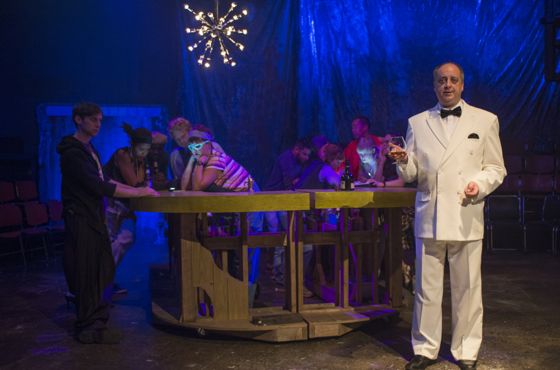| « Chicago Shakespeare Stages Warm, Humanistic King Lear | David Bowie Is at the MCA Reveals a Cultural Icon, Beyond the Pop » |
Theater Wed Sep 24 2014
House Theatre Plants a Big Wet Kiss on the Theater Industry

Photo by Michael Brosilow.
House Theatre warns its patrons in advance that its new production, Season on the Line, is "an epic love letter to the American theater." And it is indeed a love letter. A big sprawling messy exuberant love letter, sealed with a big wet kiss.
The play, written by House ensemble member Shawn Pfautsch, takes us through the tribulations, artistic and economic, of the Bad Settlement Theatre Company, based somewhere in or near a big city with an influential theater critic. In a fit of authenticity, House has even provided Bad Settlement with business cards and a website, badsettlement.org.
This three-hour epic (plus two intermissions) is Shakespearean in its ambitions. The show takes us, act by act, through the company's current season, opening with a rousing success in its diverse reimagining of The Great Gatsby (3-1/2 stars from that critic). In act 2, a less successful Balm in Gilead opens to a 1-star review and an abbreviated run. But Season on the Line revolves around the artistic director's obsession with producing a great new version of Herman Melville's Moby Dick as the season finale.
Thomas J. Cox plays artistic director Ben Adonna with passionate levels of ego, madness and budgetary neglect. He is, of course, Bad Settlement's Captain Ahab. He envisions his Moby Dick production as "a memory play--not historical fiction. Ishmael is a survivor, one that has dealt with survivor's guilt, anger, and post-traumatic stress disorder."
Director Jess McLeod, in her House debut, does a terrific job in choreographing this madness, from production meetings to rehearsals to performances, after-parties, set construction and the final striking of the set. (Because of budget exigencies, Ben decides to use one set for the whole season. Thus the Moby Dick set will serve for both Gatsby and Gilead. To complicate matters, he brings in a new dramaturg (Tiffany Yvonne Cox), who insists Moby Dick is the sacred text of the Baha'i faith.)
Fortunately, we are guided in this voyage by the nameless narrator, Ty Olwin, whose musings mirror those of Melville's Ishmael. He has just joined Bad Settlement as the new ASM (assistant stage manager) because "I answered a want ad for an Assistant Stage Manager. I showed up like a wolf-child at the door, with no idea what language these people were speaking." Bad Settlement gives him his theater education.
The theater critic (Sean Sinitski), whose praise the company yearns for, is Arthur Williamson, who may represent Ben Brantley of the New York Times or an influential Chicago critic. He first appears in a white suit, spotlighted in the audience. He leaves his seat to narrate his reviews as the casts find them posted online. After the Moby Dick opening, dressed in "civilian clothes," he appears at the theater bar and talks with the narrator. They exchange views about theater and theater criticism. The critic says,
"Look, there's only three kinds of shows. There are the shows you hate -- from the first cue to the final blackout, they're a complete waste of time on every level. They're actually very rare. Almost as rare as the great shows -- the shows that keep you fascinated from beginning to end. But 95 percent of the shows I see are the third kind. Not great, not terrible. You sit there wondering: how could it have been better? Was it the writing, the direction, the casting? What was good, what was bad? .... When I go on record about how I feel about the work, do I play up the promise, knowing a lot of people will go on my recommendation and be disappointed, or do I gently pan it, knowing that I'm practically punishing the company ledger? It's an impossible thing to do right."
You will also receive a theater education, if you are not a theater junkie already, or a former English lit major. The play is packed with theater jargon and literary references. Pfautsch's script is well written and very funny, and the theater and literary jokes fly by.
The actors, all 18 of them, do an inspired job of moving the three acts along briskly. Among many fine performances are Olwin as the Ishmael-like narrator, Cox as the director and Andy Lutz as Peter Trellis, actor and Gilead director. The multi-talented Danny Bernado is charming, graceful and funny as Kaku, playing many Bad Settlement roles. Maggie Kettering is excellent as the stage manager, as is Abu Ansari as a Ugandan actor who is cast as Gatsby and provides a voice of reason throughout the play.
The show is set in the pool room of a dilapidated motel. Lee Keenan's scenic and lighting design manages to transform the large open space into backstage, performance and party space by having the cast move large props and furniture in and out as needed. Izumi Inaba's costume designs manage to dress all three productions with creativity. Kevin O'Donnell's sound design adds the right aural touches.
Season on the Line is being presented by the House Theatre through Oct. 26 at Chopin Theatre, 1543 W. Division St. Performances are Thursday-Saturday at 7:30pm and Sunday-Monday at 7pm. Tickets are $25-35 and can be purchased online or by calling 773-769-3832.








